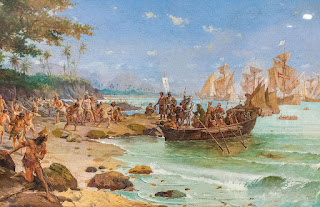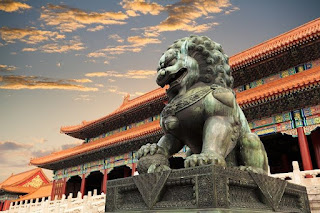History
of South America
Wednesday, February 23, 2022
Landing of
Pedro Cabral in future Brazil, 1500. Painting by Oscar da Silva, 1922.
Wednesday,
February 23, 2022. History
of South America. South America has a rich
history, from Incas and other indigenous peoples to colonization by Spanish,
Portuguese, and other European nations, onward to monarchy in Argentina,
slavery, and struggling democracies. It’s the history of Machu Pichu,
exploration and exploitation of the Amazon, Simon Bolivar, Pedro Cabral, Juan
Peron, Hugo Chavez, Augusto Pinochet, The Falklands War, Shining
Path. Select any period, any nation or group, and let us learn
together. [Proposed by Sam Coulbourn]
Schwarcz, Lilia M. and Starling, Heloisa M., Brazil: A Biography, unabridged, translated from the Portuguese, New York: Picador: Farrar, Status & Giroux. 2018, 761 pp.
These two women scholars have done a marvelous job of telling the
story of Brazil.
The Portuguese started covering the
globe early in the 15th century, along with the Spanish. All of Europe was straining to expand trade,
looking for new markets, and trying to break the stranglehold the Venetians
held over access to the Far East. When Christopher Columbus, sailing in a ship
financed by Spain, discovered a whole new continent, the race was on.
Pedro Alvares Cabral discovered the
coast of what is now Brazil in 1500. Others were discovering treasures all
around the African continent as far as China and Japan. All the explorers
wanted the quick riches of gold and silver, but for Brazil, the path to riches
began with growing sugar cane, planted, harvested and processed by African
slaves and native Brazilian Indians made slaves.
Sugar had been produced in India as
far back at 500 BC, a delicacy available only to kings, but now, thanks to
slave labor all Europeans could discover their sweet tooth.
The Portuguese combined forces with
allies in newly acquired Portuguese colonies in Africa to create a continual
chain of supply of slaves to Brazil. Settlers acquired land grants and planted
cane and built engenhos, or sugar mills for squeezing the cane, and boiling
the juice. Little by little, the owners made elegant homes near their cane
fields, built shabby dwellings for slaves, and created a new society.
As the flow of slaves continued,
owners figured new and better ways to control costs and extract the most from
African and indigenous men and some women. The most attractive women and most
industrious men found their way to working in the homes of the masters, and
this led to thousands of illegitimate mestizos (mixed race), and a new nation
of Brazil, with more Africans in the population than any country in Africa
except Nigeria.
A whole new class of landowners,
growing rich on slave labor, fought abolition fiercely, but unlike the United
States, it didn’t come to war. Slavery
ended a little at a time, until it was abolished in 1888.
Authors tell the story of Brazil
from 1500 up to the 2016 Olympics, and throughout there’s much blood spilled by
natives, slaves, settlers, and unspeakable cruelty. Comparison with treatment of slaves in the
United States comes up about equal. Brazil has a shabby history of corruption,
up and down the chain of command. The
government conducted Operation Car Wash starting in 2014, which exposed much
and many, but corruption continues, it seems.
Current president Jair Balsonaro (b.1955)
took over in 2019. He is a far-right conservative, favors military government
(He was an army officer). He’s against covid19 restrictions, anti-LGBTQ,
against protection of indigenous people and favors deforestation.
Sam Coulbourn
2022
Wednesday, March 30, 2022. Reconstruction,
1865-77 Abraham Lincoln had a clear
picture of what should be done after the end of the War Between the States, but
his assassination meant that Andrew Johnson, the Democrat who succeeded him,
would be President. Read about this dangerous, murderous time in our history as
we sought to regain the 11 Confederate States in the Union. Read
about the growth of white supremacist organizations, and the different ways
that America handled the end of slavery, and welcoming (?) millions of newly
freed Africans to America. [Proposed by Mary Beth Smith]
Ukraine in 8th to 13
centuries. (Washington Post)
Wednesday, April 27, 2022. History of Ukraine and the
Dnieper and Don Rivers. "Believe
me, you will acquire immortal fame such as no other sovereign of Russia ever
had," said Grigoriy Potemkin, a
prominent adviser to Catherine the Great, when offering the empress counsel in 1780 on plans to
wrest Crimea away from Ottoman suzerainty. "This glory will open the
way to still further and greater glory." Events in 2022 cast a
spotlight on Russia and Ukraine. Read any book that explores the rich history
of this fertile land north of the Black Sea and south of Russia. [Proposed by Mary Beth Smith]
Henry Ford
Wednesday, May 25, 2022.
Immigrants to America who have made a difference. Read and tell us
the story of an immigrant to the U.S. who has brought a wondrous addition to
his/her new nation. Perhaps the newcomers started a family of creative
Americans; perhaps they themselves made important advances. Look at Henry Ford,
Albert Einstein, Sergey Brin, Audrey Hepburn, Chinua Achebe, Cary Grant, Irving
Berlin, Nikola Tesla, more. [Proposed by Mary Beth Smith.]
Lincoln
Assassination
Wednesday, June 29, 2022. Assassinations and executions of leaders. Read the stories of how famous people were assassinated
and what came after. From modern times--- Anwar Sadat, Olaf Palme, Yitzhak
Rabin, Aldo Moro, Mahatma Gandhi, Indira Gandhi, or Presidents Lincoln,
Garfield, McKinley, and Kennedy, or Franz Ferdinand, King of Albania, Nicholas
II of Russia, or earlier-- Henry VI, James III, Henry III, Julius Caesar.
[Proposed by Janos Posfai]
Ironclad USS Monitor, 1862
Wednesday, July 27, 2022. Game changing maritime
inventions. Read about the days of
ships propelled by sail, oars, coal or oil, paddle wheelers, steam engines, or
warships like dreadnought, submarines, aircraft carriers, or torpedoes,
propellers, chronometers, sextants, etc. [Proposed by Janos Posfai]
Wednesday, August 31, 2022. How Should We Deal with China? Let's dig into the history of China and try to learn how
the United States should approach China, in terms of human rights, trade
policy, Taiwan, Hong Kong, Global Warming, Nuclear Weapon Proliferation,
autonomous weapons, public health, and much more. We are tremendously
interdependent: should we continue to view China as an Opponent? [Proposed
by Walter Frederick]
Ethel
and Julius Rosenberg
Wednesday, September 28, 2022. Trials of historical significance. Read about the Nuremberg
War Crimes Trials (1945-46), or the Trial of Julius and Ethel Rosenberg (1951),
Burning of the Reichstag trial (1933), or the Trial of Galileo Galilei (1633), Martin Luther and the Diet of Worms,
(1521) (not what it sounds like), the Trial and Death of Socrates by Plato (399
BC), or many more. [Proposed by Janos Posfai]







